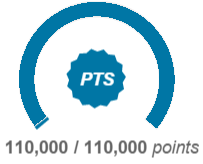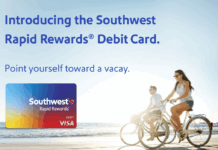NOTICE: This post references card features that have changed, expired, or are not currently available
 Argument Overview
Argument Overview
In this post, I argue the following:
- The redemption value of Southwest Rapid Rewards points, relative to cash, is the same with or without the Companion Pass. This point hinges on the fact that the Companion Pass allows you to add a companion for free regardless of whether you pay with points or cash.
- When working towards a Companion Pass, it can be worth “paying” more for qualifying points than you should pay otherwise because those points get you closer to earning a Companion Pass.
Background
A few days ago I published “Six ways to secure a Southwest Companion Pass without flying.” In that post, I listed a number of ways one can earn the required 110,000 Southwest points needed for a Companion Pass. That pass, once acquired is good for an unlimited number of flights for the rest of that calendar year and all of the next.
Rapid Rewards points are usually worth about 1.5 cents each towards Wanna Get Away fares (see: The new true value of Southwest points). With the Companion Pass in-hand, you can add a companion to your award flight for free (not counting TSA fees). Therefore, points should be worth 3 cents each when you have a companion pass, right? Wrong.
Example
I looked up a random flight: Baltimore/Washington to Las Vegas, nonstop, and found a nonstop fare of $242:

The same flight costs 16,110 in points:

In this example, points are worth approximately 1.5 cents each ($242 / 16,110). Now suppose we had a Companion Pass and added a companion to the flight. If you paid cash for the flight, the total cost of the airfare would still be $242 (since you can add a companion for free to either a paid or award flight). And if you paid with points, the total cost would still be 16,110 points. In other words, points are still worth about 1.5 cents each when you have a Companion Pass.
The per point value is the same with or without a Companion Pass. Yes, with the Companion Pass you can get twice as much flight value, but that’s true regardless of whether you pay with points or with cash.
Why this matters
If you have an opportunity to acquire Southwest points, but there’s a cost (either a direct cost or an opportunity cost), you shouldn’t assume that it makes sense to pay more than 1.5 cents per point. Here’s a simple example: suppose you plan to buy something online and can choose between earning 5 Southwest points per dollar or 10% cash back through various portals. If you choose the 5X Southwest points, then you have essentially chosen to buy those points for 2 cents each (see: Buying points, unwittingly). Is it worth it? It can be, if you need extra points for a specific award, but in general you’re better off with the cash – even if you have a Companion Pass.
Why new points are more valuable before you get the pass
Points already in your account are worth the same regardless of whether you have a Companion Pass or not. However, most newly acquired points count towards your Companion Pass eligibility. Those points are more valuable because they help you get that valuable Companion Pass. How much more valuable are those points? That depends upon how much money and points you end up saving as a result of getting that pass. The more money and points you end up saving due to the Companion Pass, the more valuable were those 110,000 qualifying points.
Suppose, for example, you have an opportunity to acquire points for 1.5 cents each in a way that would result in Companion Pass eligible points. Once you have the Companion Pass, it wouldn’t necessarily make sense to do the deal since you wouldn’t gain anything. The points you acquire would be worth about the amount paid, so why bother? On the other hand, if you haven’t yet earned enough points for your Companion Pass, then it makes a lot of sense. For 1.5 cents per point, you would get points that can be redeemed for about 1.5 cents per point value and you would get closer to obtaining your Companion Pass .





[…] do I say this? Because, if you go based on the argument that Southwest Points are worth roughly 1.5 cents per point, and you can book travel via the Ultimate Rewards Travel (over the phone), with the Chase Sapphire […]
Simple explanation that could have been used in the article:
Don’t use a SW CC to earn SW points instead of using a 2% CB card after earning CP.
Some people are doing the math wrong after earning CP:
If 1.5 cpp SW points are worth double (3 cpp) after earning CP, then 2% CB card is worth worth double (4%) as well.
Instead of saying 3 cpp > 2% CB, we should be saying 3 cpp < 4% CB
Of course, there are clearly more factors than a general cpp that go into the value of SW points vs. cash back as well:
1. SW cancellation flexibility
2. using portals to gain points 3. opportunity cost of acquiring SW points through CCs vs. putting spend on other cards
4. additional points earned on flights when using cash
5. flexibility of cash in general vs. having SW points
Even if you'd argue that the "tiebreakers" favor using a SW CC after earning CP (I'd argue in the other direction), there's no way they're making up for the 1% gap in value.
TL;DR: Once you have earned the SW CP, you'll get more value out of a 2% CB card than a SW CC.
The points are worth more BEFORE you get the companion pass because they are essentially “buying” a portion of that companion pass. However, once you have reached the 110,000 points needed, they no longer are buying you anything more than cash. In fact, you may be losing value if you are earning SW points at a rate that is less than their comparable value in dollars from a cash back earning card. Right?? Isn’t this clear or is this totally the wrong interpretation?
That’s right
I think that this post was needlessly confusing, and then some of the comments only served to make it more convoluted. The bottom line is this: There is no reason to “buy” points at more than 1.5 cents value because you can essentially “buy” them at that rate when you book your flight if you care to look at it that way. So in FM’s example, if you were willing to “buy” points at 3 cents each because you figured that 2 people would be flying and they should be worth double, you would end up “paying” (either with actual money, or opportunity cost) $483.30 for 16,110 points. Instead, you could just pay $242 for the flight and your companion would still fly free. I think where so many people are getting confused (including myself initially) is that we instinctively think that if 2 people are flying that our points are worth double, which at the point of redemption is true because we are only paying 16,110 instead of 32,220 for 2 tickets, but if you were willing to pay 3 cents each for those points then you essentially paid $483.30 for those 2 tickets, in which case you might as well have just paid cash for 2 tickets ($484) and not even bothered with earning the companion pass.
I am completely confused, even after reading people’s comments. Does it matter what your points are worth with or without the CP? Of course they would be worth the same, the difference is that now 2 people travel for the same price instead of 1. I don’t think anyone ever believed that points would be worth more after you acquire the CP, just that now 2 people can travel for the same amount, whether cash or points. If this is the case, this article makes absolutely no sense.
I completely agree. SW points are worth the same before and after the companion pass, unless you want to account for the value of earning the pass which is between 0 and ??
Anyway, what I really think is interesting would be to figure out what a point is worth. 1.5 cents is close, until you add in
1) Points are very flexible on cancellation
and subtract
1) The rebate points you’d earn flying a paid flight
2) The credit card points paying for the flight
3) Any points/discount/promotion you get paying for the flight with a gift card (this is potentially 20% or more)
4) Portal bonuses for transactions
I’m afraid the way I’ve been hitting the last 3, I’ve been, at times, able to get the discounts up into the 30% range, which would make the SW points worth significantly less than 1.5 cents. I wouldn’t pay more than a penny for them.
Scott, why do you say points are very flexible on cancellation? So is cash.
If you buy a ticket for cash and then cancel, you’d just get a voucher for the cash amount, wouldn’t you?
I don’t fly SW, but I think here’s the summary:
After getting CP, one should consider earning other points/miles that are worth more than 1.5cents each. If one chooses to continue to earn SW points, then one will miss out on more valuable points/miles.
FM, your article is completely incongruous with the concept of RDP/RDM and EQP/EQM in FF land. In the case of WN in this article, comparing EQP to RDP is comparing apples to oranges. Elite Qualifying Points (EQP) are completely subjective to the individual FF. Reedemable Points’ (RDP) value lies in how they are used. They are not worth less before getting the companion pass.
You’d be better off saying you should use cash to get your EQPs to 100k or 100 flights for the CP FIRST AND THEN redeeming points.
I’d also add that the value of the RDM could spike up to close to 3c if the CP was earned NOT via BIS cash flights. Reason: If you earned 110k points in a year via CC bonuses and spend, you would not have spent any cash in the build up to CC. The value of the points IS then worth 3c because both people are flying on one set of points, when the alternative would be paying cash for TWO tickets.
Points are worth even LESS if you factor in redeemable miles earned by paying cash instead. Especially if both you and your companion earn miles on the flight. Is that the case?
True, but when paying with points, the tickets are more truly refundable and you often get better than 1.5 cents per point value. So, I feel comfortable “fudging” and leaving the number at 1.5
I think this post is right on. The hobbyists will have to be explained this somewhat simple idea and the rest of us don’t need to be told this. I always convert the points from different rewards programs to the same currency (dollars) in order to fairly compare their true value (cashback monitor is a good source for this). Sure it is true that the value can change from person to person and their opportunities to use their points can be different, but that is where a person must decide for themselves what a point in a particular program is worth to them. For instance, I know that Chase UR points are worth more than 2 cents per point for a lot of people, yet, I have never received that value despite having accumulated several hundred thousand of them over the years. It was not lack of knowing how to best use them, but it was simply the opportunity cost of using them that guided my decision. If I was traveling 100 days of the year, I probably would have chose to maximize the value of those points. But, since I am limited to when and how I travel, I chose to use those points in a different manner.
Everyone needs to figure out for themselves and their circumstance what the “expected value” is from their spending with different programs. If you have the companion pass and value the southwest points at double the value of 1.5 cents (3 cents) that means you are earning 3% cash back on your purchase. Obviously using a different card that earns 5% cash back is going to buy you more airfare (in dollars) on that airline.
Since there’s clearly a lot of confusion here, I added a short argument overview to the top of this post. Hopefully that will help clarify things.
I understand the post. I still find it insipid and pointless though
The point here is that Companion Pass doesn’t increase the value of SW points relative to cash; it increases the value of SW travel in general relative to all other domestic flights.
If you have the CP, other miles are worth half as much as they used to be. That’s simple enough and obvious enough.
Incidentally, the confusion in the comments section here means that this post was, in fact, warranted, precisely because of the commenters above who say it wasn’t.
Have to agree with most others. While I get the point, it could have been done in 2-3 sentences.
In short, 2% is better than a Southwest mile. People say to me, “When I have the Companion Pass, the value of every SW mile is doubled, every mile is worth 3%, and now it’s better to accumulate SW miles than cash back.”
They are wrong. First of all, a Companion Pass doesn’t double the value of Southwest miles for most people in real life. That would assume you never, ever travel alone. Or what about a family of three?
Secondly, since the Companion Pass works on cash tickets as well as points, the Companion Pass doubles the value of your cash when buying Southwest tickets. So, if you earn 2% cash back and apply it to two Southwest tickets, the buying power of that cash back was 4%, which is better than the 3% you’d get using miles.
Conclusion: after getting your Southwest Companion Pass, you are better off spending on a 2% card than on a Chase Southwest card.
useless mental masturbation…
get the pass and fly if it makes sense for your situation..
and the points bookings are refundable so use points when you want flexibility.